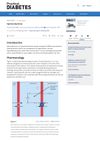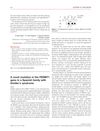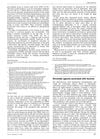Search
for
Sort by
Research
240-270 / 578 results
research Spironolactone for Female Acne: A Meta-Analysis of Safety and Efficacy
Spironolactone effectively treats female acne with few side effects.

research Diuretics
Diuretics help the body get rid of excess salt and water by acting on the kidneys in different ways.

research Spironolactone
Spironolactone helps reduce hospital visits and death from heart issues, lowers blood pressure, but has unclear effects on heart failure with normal heart pump function and can cause high potassium and breast enlargement in men.

research A Novel Mutation in the FERMT1 Gene in a Spanish Family with Kindler’s Syndrome
Researchers found a new mutation in the FERMT1 gene in a Spanish family with Kindler syndrome.

research Spironolactone-Induced Hepatitis
A woman's liver problems improved after she stopped taking spironolactone.

research Cardiometabolic Risk Factors in Women with Non-Classic Congenital Adrenal Hyperplasia
Women with non-classic congenital adrenal hyperplasia have higher risk for heart and metabolic problems.

research Adverse Effects of Opioid Analgesic Drugs
Opioid painkillers can cause many side effects, including breathing problems and addiction, but are generally considered safe when used properly.

research Potassium Channel Therapeutics at the Bedside
Potassium channel openers are effective in treating heart conditions, high blood pressure, pulmonary diseases, bladder issues, and hair loss, but more selective drugs are needed.

research Results of Clinical Examinations, Laboratory Tests, and Ultrasonography in Dogs with Pituitary-Dependent Hyperadrenocorticism Treated with Trilostane
Trilostane effectively and safely treats dogs with pituitary-dependent hyperadrenocorticism, improving symptoms and adrenal gland size.

research Minoxidil: A Review of Its Pharmacological Properties and Therapeutic Use
Minoxidil effectively treats severe hypertension but may cause side effects, so careful monitoring is needed.

research 46,XY DSD Due to Impaired Androgen Production
Impaired androgen production in 46,XY DSDs causes ambiguous genitalia and requires long-term care.

research Female Androgenetic Alopecia: An Update on Diagnosis and Management
FAGA diagnosis uses blood tests and trichoscopy, with treatments like topical minoxidil, oral anti-androgens, and hormone-modulating drugs.

research Hirsutism
Hirsutism is excessive male-pattern hair growth in women, often caused by hormonal imbalances, and requires ongoing treatment to manage.

research Reversible Ageusia Associated With Losartan
Losartan can cause temporary loss of taste.

research Is Hormonal Treatment Still an Option in Acne Today?
Hormonal treatments are effective as a second-line option for moderate-to-severe acne in females, but should be used with caution due to health risks.

research Hormonal Therapy in Dermatology
Hormonal therapy is a treatment option for acne, the only medical treatment for hirsutism, and the most promising for androgenetic alopecia.

research Clinical Case Seminar: Postmenopausal Androgen Excess - Challenges in Diagnostic Work-Up and Management of Ovarian Thecosis
The conclusion is that removing both ovaries is the best treatment for excess male hormones in postmenopausal women, with medication as another option, and managing insulin resistance is important for diagnosis and treatment.

research Effect of Potassium on Blood Sugar and Plasma Insulin Levels in Patients Undergoing Peritoneal Dialysis and Hemodialysis
Potassium levels affect blood sugar and insulin during dialysis, and malnutrition changes children's hair roots.

research The Modern Management of Hirsutism
Effective hirsutism management requires identifying the cause, combining new and traditional treatments, and setting realistic expectations for patients.

research Medical Treatment of Hirsutism in Women
Treating hirsutism in women often requires a mix of medications and cosmetic methods for best results.

research Clinical Characterization of Men with Long QT Syndrome and Torsades de Pointes Associated with Hypogonadism: A Review and Pharmacovigilance Study
Low testosterone in men is a risk factor for a specific heart rhythm issue, and testosterone treatment may help prevent it.

research Hirsutism
Hirsutism is too much hair growth in women like the pattern in men, often caused by high male hormones, and can be treated with hormone control and hair removal methods.

research Medical Treatment Regimens of Hirsutism
Low-dose anti-androgen drugs and certain drug combinations are effective for hirsutism, and insulin sensitizers show promise, especially for those with polycystic ovarian syndrome.

research Female Androgenetic Alopecia: An Update
Hair loss in women can be slowed with treatment, but more research needed for better solutions.

research Epicardial Fat Thickness in Children with Classic Congenital Adrenal Hyperplasia
Children with classic congenital adrenal hyperplasia have thicker heart fat and are at higher risk for heart problems and early atherosclerosis.

research Diagnosis and Management of Polycystic Ovary Syndrome (PCOS)
The document concludes that managing PCOS involves treating symptoms, regulating periods, and reducing health risks, with specific medications for fertility and metabolic issues.

research Transgender and Migraine: Impact of Hormone Therapy
Hormone therapy may increase migraines in transgender women and decrease them in transgender men; more research is needed on migraine management in transgender individuals.

research Acne
Acne is a common skin condition that can be influenced by diet, lifestyle, and hormones, and requires a treatment approach that includes psychological considerations.

research Hirsutism: From Brazil to a Place Near You
No treatment fully stops excessive hair growth in women, but various methods can help manage it effectively.